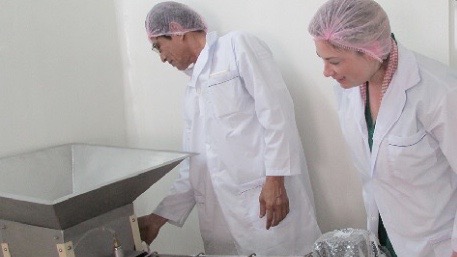Health research
Halifax researcher awarded $1M grant to continue work in Cambodia
Table salt research aims to combat disease

caption

caption
Kyly Whitfield and a colleague work in their Cambodia research lab.A researcher from Mount Saint Vincent University is on a mission to change lives with salt.
Kyly Whitfield was awarded $1 million from the Bill and Melinda Gates Foundation and the Sackler Institute of Biomedical Sciences at New York University to continue her research into thiamine deficiencies in Cambodia and southeast Asian countries.
Thiamine, also knows as vitamin B1, is necessary for the growth and development of healthy cells.
The diet in these regions consists of 65 per cent white rice, so residents aren’t receiving proper vitamins and nutrients. Infants are susceptible to beriberi, a disease caused by a lack of thiamine, because their mother’s breast milk doesn’t contain enough of the supplement. It can result in neural inflammation and heart damage, leading to death.
“Thiamine is a low hanging fruit; it is in our grasp to cure this disease,” Whitfield said. “I am studying food fortification, which is adding vitamins to food we already eat. We want to do that with thiamine.”

caption
Whitfield poses with children in Cambodia.“Thiamine deficiencies can kill infants as quickly as in two hours,” said Whitfield. “If you give them a shot of thiamine, in one hour they are back to normal.”
Whitfield said that as a nutritional researcher, she studies diseases that could have been cured 100 years ago. During her research, she was shocked to learn that infants still develop beriberi, mainly in these developing countries.
The $1 million grant will allow Whitfield to research the correct amount of thiamine needed for mothers, so they can pass it on to their infants when they breastfeed. Whitfield said a second aspect of the research is to determine if it is feasible to create a thiamine fortified salt.
“Salt is affordable and abundant in southeast Asia,” she said. “The rural areas all use salt. It is such an easy fix; it is within our reach.”
The Bill and Melinda Gates Foundation works to reduce inequalities in health care in developing countries by offering grants to researchers such as Whitfield. The foundation has donated a total of $41.3 billion in grants worldwide since 2000.
“I was thrilled that they saw the potential and chance to put thiamine deficiency to bed once and for all,” Whitfield said. “That will prevent a lot of deaths.”
Whitfield’s research is expected to be completed by 2019.

